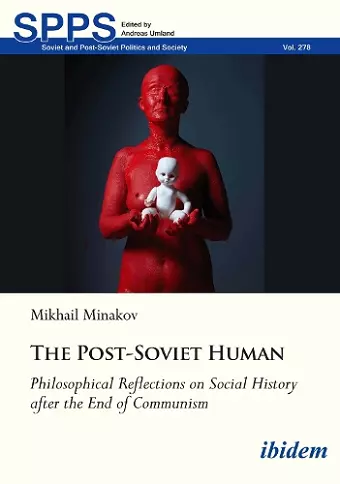The Post-Soviet Human
Philosophical Reflections on Social History after the End of Communism
Format:Paperback
Publisher:ibidem-Verlag, Jessica Haunschild u Christian Schon
Published:29th Jul '24
Currently unavailable, our supplier has not provided us a restock date

The post-Soviet period (1989–2022) was, in its own way, an unprecedented era in human history. Its uniqueness lied not only in the fact that the USSR’s dissolution had opened opportunities for the people and nations of Eastern Europe and northern Eurasia to experience freedom and test their creative powers, but also in the fact that these opportunities did not extract a price comparable to the cost in human lives and suffering during the Russian Revolution and Civil War of 1917–24. The post-Soviet Human attempted to establish free politics and economy, as well as to gain collective emancipation and personal freedom during this era. Even though these attempts failed in most cases, the post-Soviet Human’s political creativity—with its democratic and autocratic achievements—was an intriguing phenomenon worth deeper study and understanding. Without learning the lessons of post-Soviet history, the East European and north Eurasian peoples are doomed to perpetually repeat its vicious cycles of tragedy and destruction.
The first thorough and provocative account of a new stage of human evolution: the Homo Post-Soveticus—either a bitter irony or a warning. In any case, this is a must-read for those who still want to understand why the post-Soviet space, after the caesura of 1989-91, was not where optimists expected it to be, and why utopia became dystopia. —Georgiy Kasianov, Maria Curie-Skłodowska University, Lublin
Minakov's book is a fascinating history of the era that ended right before our eyes. The post-Soviet period (1991-2022) indeed was a time of searching for a way out of totalitarian domination, the successes and failures of Eastern European societies. The combination of philosophical, sociological and historical perspectives on the most complex and dramatic processes in this region allowed the author to refrain from simplification, illusions and ideological bias, and to thereby preserve the sobriety, depth and non-triviality of his analysis. This is one of the best works written in recent years on the trajectories of the post-Soviet transit. —Lev Gudkov, Levada Center, Moscow
What kind of human being has emerged out of the ruins of Soviet civilization? This is the question, that Mikhail Minakov, one of the most insightful observers of the post-Soviet world, tries to answer in this original book—a splendid mix of history, philosophy, anthropology and life lived among the ruins. — Ivan Krastev, Institute for Human Sciences, Vienna
Minakov’s book captures the mood of the day that the Russian full-scale invasion of Ukraine marked the end of the era in the region’s development, commonly referred to as “post-Soviet.” The research delves into the unique human condition on the terrain hollowed out by the symbolic bankruptcy of the Soviet utopia and exploited by an emerging oligarchy that efficiently captured the states and exhausted public imagination. Despite all the odds, there remained a limited yet real opportunity for “the leap” toward democratic emancipation. The book reflects the interdisciplinary experience of its author, who has spent decades engaging with political philosophy and regional studies. It is a significant read for those seeking deeper interpretations of the known facts about the recent history of Eastern Europe and Northern Eurasia. — Valeria Korablyova, Charles University, Prague
“The Post-Soviet Human” is a three decades-long testimony of creation of the post-Soviet Uebermensch who had been involved in constant effort of overcoming the Soviet Last Man. Sharply denoting “post-Soviet” as period from 1991 to 2022, the author shows under which organizing principles of the existence new essence had been formed in Eastern Europe and Northern Eurasia. The book would be a perfect source for those who are searching for multidimensional understanding of diverse and often mutually exclusive developments in socioeconomic, political and cultural domains that citizens of newly established states were facing after the collapse of the Soviet Union. — Mariam Pipia, General Staff College, Tbilisi
ISBN: 9783838219431
Dimensions: unknown
Weight: unknown
160 pages